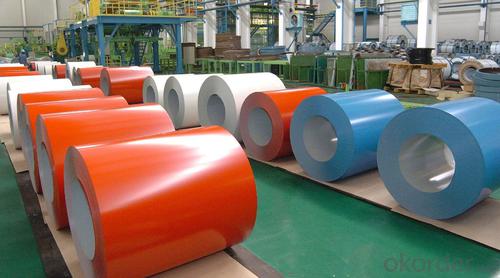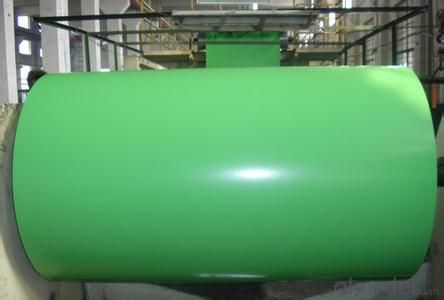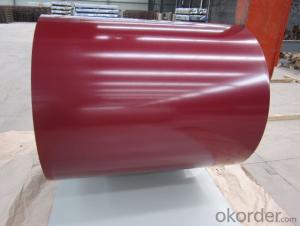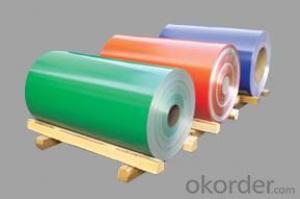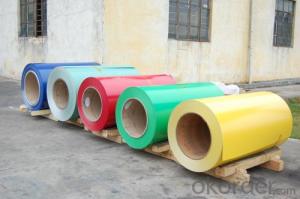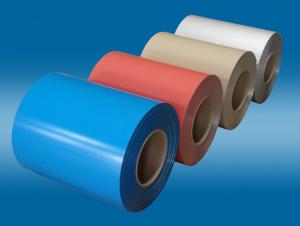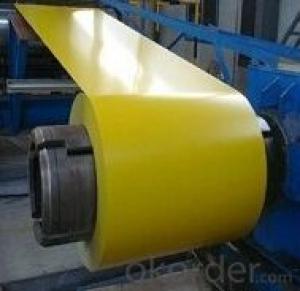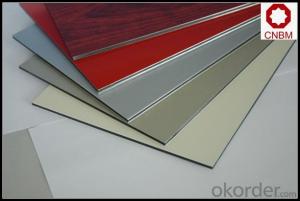Prepainted Aluminum Coil Price - Colored Coated Aluminum Coils
- Loading Port:
- China Main Port
- Payment Terms:
- TT or LC
- Min Order Qty:
- 5 m.t.
- Supply Capability:
- 10000 m.t./month
OKorder Service Pledge
OKorder Financial Service
You Might Also Like
1.Structure of Aluminum Coils Colored Coated Description
Aluminum coils color coated are of a wide range of colors, which give wonderful appearance no matter in residential and commercial constructions or great exhibition centers.
Aluminum coils color coated have been widely used in the fields of construction and decoration, electronic applications, lighting decoration, air-condition air pipes, sandwich panels and drainages etc.
2.Main Features of the Aluminum Coils Colored Coated
• Superior quality of raw material
• Reasonable and stable chemical composition
• Accurate tolerance
• Goode mechanical property
3.Aluminum Coils Colored Coated Images
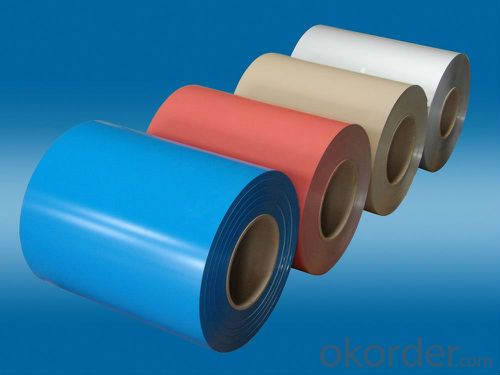
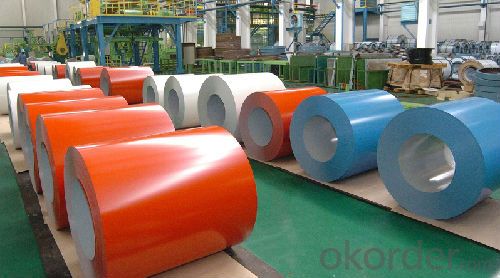
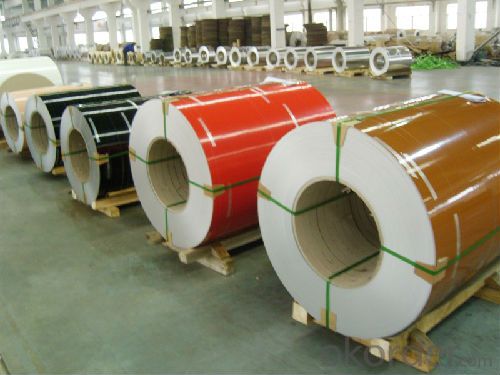
4.Aluminum Coils Colored Coated Specification
| Alloy | AA1xxx,AA3xxx,AA5xxx |
| Temper | H14,H16,H18,H22,H24,H26,H32,O/F |
| Thickness | 0.03mm-3.0mm |
| Width | 30mm-1700mm |
| Coating | PE,PVDF,Epoxy |
| Painting Thickness | Standard 16-25 Mic, max 40 Mic |
| Color | According to RAL colors or customers' samples |
| Standard | GB/T 17748-1999 |
5. FAQ of Aluminum Coils Colored Coated
A.How to guarantee the quality?
Customers are welcome to our mill to visit and check the products. Besides, we can arrange a third party to test theAluminum Coils Colored Coated products.
B.When will you deliver the products?
The Aluminum Coils Colored Coated will be delivered within 35 days after receiving advanced payment or original L/C.
- Q: Can aluminum coils be used in food processing industries?
- Yes, aluminum coils can be used in food processing industries. Aluminum is non-toxic, lightweight, and has excellent conductivity, making it suitable for various applications in the food industry. It is commonly used in food packaging, cooking utensils, and equipment, including heat exchangers and refrigeration units. Additionally, aluminum coils are corrosion-resistant and easy to clean, making them a safe and hygienic choice for food processing.
- Q: Are there any limitations on the width-to-thickness ratio of aluminum coils?
- Yes, there are limitations on the width-to-thickness ratio of aluminum coils. The specific limitations depend on various factors such as the intended application, manufacturing process, and the mechanical properties of the aluminum alloy being used. Generally, a higher width-to-thickness ratio can result in increased material instability, difficulty in handling, and potential quality issues. Therefore, it is necessary to carefully consider these factors and consult industry standards and guidelines to determine the appropriate width-to-thickness ratio for aluminum coils.
- Q: Can aluminum coils be used in HVAC heat exchangers?
- Yes, aluminum coils can be used in HVAC heat exchangers. Aluminum is a commonly used material in heat exchangers due to its excellent thermal conductivity, lightweight nature, and resistance to corrosion. It allows for efficient heat transfer and is often preferred over other materials like copper in certain HVAC applications.
- Q: Are aluminum coils suitable for coil winding applications?
- Coil winding applications can utilize aluminum coils, as they possess numerous advantageous properties. Firstly, aluminum is lightweight, facilitating easier handling and transportation. Industries like automotive and aerospace, which prioritize weight reduction, find this particularly beneficial. Moreover, aluminum exhibits excellent conductivity, ensuring efficient electrical current flow within the coil. This is especially advantageous for applications requiring high performance and low resistance, such as transformers and electric motors. Additionally, aluminum's high resistance to corrosion renders it suitable for outdoor and harsh environments. Unlike metals like steel, it does not rust and can endure exposure to moisture and chemicals. Furthermore, aluminum coils offer cost-effectiveness. Compared to metals like copper, commonly used in coil winding, aluminum is generally more affordable. Thus, it presents a cost-efficient option for various industries. Nevertheless, it is important to acknowledge that aluminum has lower electrical conductivity than copper. Therefore, in applications where high conductivity is paramount, such as power transmission, copper coils may be more suitable. Nonetheless, aluminum coils provide numerous benefits and find widespread use in various coil winding applications.
- Q: Is aluminium a safe metal to put in ones mouth without any side effects?
- Why wouldn't it be. You drink soda from an aluminum can, you wrap food in aluminum foil.
- Q: What are the potential risks of using aluminum coils in specific applications?
- Using aluminum coils in specific applications presents several potential risks. Firstly, due to its high reactivity, aluminum can undergo oxidation and form aluminum oxide. While this oxide layer can be protective, it can break down in certain environments, like acidic or alkaline conditions, leading to corrosion and compromising the coils' structural integrity and lifespan. Secondly, aluminum coils have lower strength compared to metals like steel, making them vulnerable to deformation or damage under heavy loads or high pressure. Mechanical stress can cause bending or cracking, resulting in potential failure. Furthermore, aluminum has a relatively low melting point compared to metals like copper or iron. As a result, when exposed to high temperatures, such as in heating or cooling systems, there is a risk of the coils melting or deforming, leading to system malfunctions, reduced efficiency, or safety hazards. Another risk lies in the electrical conductivity of aluminum coils. While aluminum conducts electricity well, its resistance is higher than copper. This can lead to increased power losses and reduced energy efficiency in electrical applications. Additionally, aluminum coils may be more prone to electrical arcing or sparking, posing a fire hazard. Lastly, it is important to note that aluminum is lightweight, which can be advantageous, but it also means that aluminum coils may have lower durability and resistance to physical impacts or external forces compared to heavier metals. In environments with vibrations, impacts, or other mechanical stresses, the coils may be more susceptible to damage or premature failure. In conclusion, although aluminum coils offer benefits like light weight, good thermal conductivity, and corrosion resistance, it is vital to carefully consider the potential risks associated with their use in specific applications. Proper design, maintenance, and compatibility with operating conditions are crucial to mitigate these risks and ensure the safe and effective performance of aluminum coils.
- Q: What are the regulations and standards governing the production of aluminum coils?
- The production of aluminum coils is governed by a variety of regulations and standards to ensure product quality, safety, and environmental sustainability. These regulations may vary depending on the country or region, but there are some common industry standards that are widely recognized. One of the primary regulations governing the production of aluminum coils is related to product quality and specifications. Aluminum coils must meet specific standards set by organizations such as the American Society for Testing and Materials (ASTM) or the International Organization for Standardization (ISO). These standards define the physical and chemical properties that the aluminum coils must possess, such as thickness, width, tensile strength, and chemical composition. In terms of safety, there are regulations in place to protect workers and facilities involved in the production process. Occupational Safety and Health Administration (OSHA) regulations, for example, outline safety measures and requirements to prevent accidents and ensure safe working conditions. This may include guidelines for handling and storing aluminum coils, personal protective equipment requirements, and emergency response protocols. Additionally, environmental regulations play a crucial role in the production of aluminum coils. These regulations aim to minimize the impact of the production process on the environment and ensure sustainable practices. For instance, there may be regulations regarding the treatment and disposal of waste materials, the use of energy-efficient equipment, and the reduction of greenhouse gas emissions. Furthermore, industry-specific organizations such as the Aluminum Association in the United States or the European Aluminium Association in Europe also establish voluntary standards and best practices for the production of aluminum coils. These organizations work closely with manufacturers to develop guidelines for quality control, sustainability, and continuous improvement in the industry. Overall, the production of aluminum coils is governed by a combination of regulations and standards that encompass product quality, safety, and environmental considerations. Compliance with these regulations ensures the production of high-quality aluminum coils that meet customer requirements and contribute to a sustainable and responsible industry.
- Q: What are the different widths available for aluminum coils?
- The different widths available for aluminum coils range from narrow widths of around 3 inches to wider widths of up to 60 inches or more, depending on the specific requirements and applications.
- Q: Foshan where there are high-quality aluminum and aluminum rolls for sale?
- Hexi Industrial Zone, Yanbu District, Nanhai District, Foshan
- Q: Are aluminum coils suitable for insulation purposes?
- Indeed, aluminum coils are well-suited for insulation purposes due to their exceptional heat and electricity conductivity. This quality makes them a perfect selection for insulation applications. Aluminum coils find utility in a wide range of uses such as HVAC systems, refrigeration units, and electrical wiring. Typically, these coils are coated with an insulating material like polyurethane foam or fiberglass to augment their insulation capabilities. The amalgamation of aluminum and insulation works wonders in impeding the transfer of heat or cold, thereby providing superb thermal insulation. Moreover, aluminum is lightweight, sturdy, and resistant to corrosion, rendering it a dependable choice for long-lasting insulation requirements.
Send your message to us
Prepainted Aluminum Coil Price - Colored Coated Aluminum Coils
- Loading Port:
- China Main Port
- Payment Terms:
- TT or LC
- Min Order Qty:
- 5 m.t.
- Supply Capability:
- 10000 m.t./month
OKorder Service Pledge
OKorder Financial Service
Similar products
Hot products
Hot Searches
Related keywords



